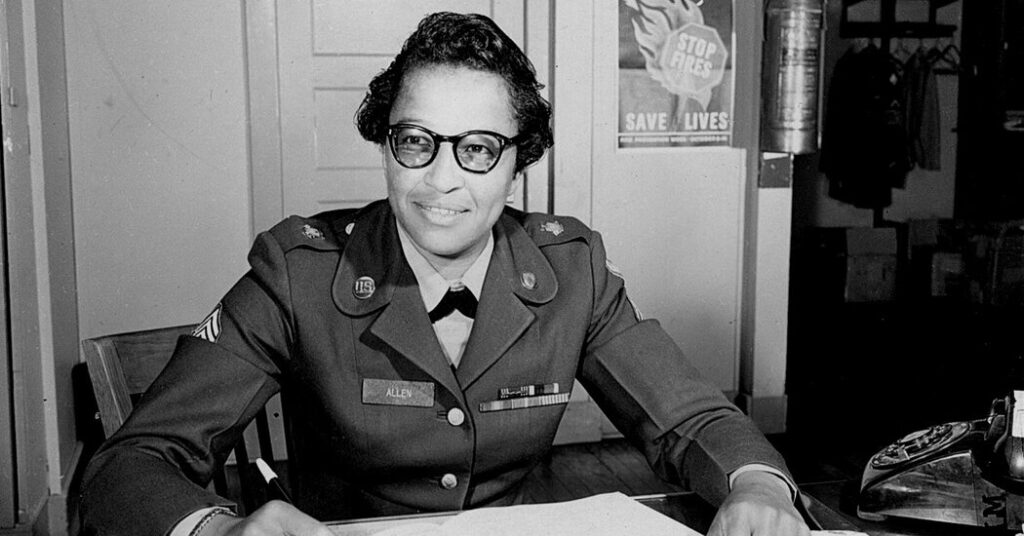Doris Allen, an Military intelligence analyst in the course of the Vietnam Conflict whose warning in regards to the impending assaults in early 1968 by North Vietnamese and Viet Cong forces that grew to become often called the Tet offensive was ignored by higher-ups, died on June 11 in Oakland, Calif. She was 97.
Her dying, in a hospital, was confirmed by Amy Stork, chief of public affairs for the Military Intelligence Heart of Excellence.
Specialist Allen, who enlisted within the U.S. Military’s Ladies’s Military Corps in 1950, volunteered to serve in Vietnam in 1967, hoping to make use of her intelligence coaching to save lots of lives. She had been the primary lady to attend the Military’s prisoner of warfare interrogation course and labored for 2 years because the strategic intelligence analyst for Latin American affairs at Fort Bragg, N.C., now Fort Liberty.
Working from the Military Operations Heart in Lengthy Binh, South Vietnam, Specialist Allen developed intelligence in late 1967 that detected a buildup of at the least 50,000 enemy troops, maybe bolstered by Chinese language troopers, who had been getting ready to assault South Vietnamese targets. And she or he pinpointed when the operation would begin: Jan. 31, 1968.
In an interview for the guide “A Piece of My Coronary heart: The Tales of 26 American Ladies Who Served in Vietnam” (1986), by Keith Walker, Specialist Allen recalled writing a report warning that “we’d higher get our stuff collectively as a result of that is what’s dealing with us, that is going to occur and it’s going to occur on such and such a day, round such and such a time.”
She stated she informed an intelligence officer: “We have to disseminate this. It’s received to be informed.”
But it surely wasn’t. She pushed for somebody up the chain of command to take her report critically, however nobody did. On Jan. 30, 1968 — according to what she predicted — the enemy shocked American and South Vietnamese army leaders with the scale and scope of their assaults.
U.S. and South Vietnamese forces sustained heavy losses early on earlier than later repelling the assaults. It was a turning level within the warfare, additional undermining American public assist for it.
The Military’s refusal to take Specialist Allen’s evaluation critically advised to her that she was considered with prejudice, as a Black lady who was not an officer. She was considered one of about 700 ladies within the corps, often called WACs, serving in intelligence positions in the course of the Vietnam period, and solely 10 p.c had been Black.
In 1991, she informed Newsday, “My credibility was like nothing: lady — Black lady, at that.”
In 2012, she informed an Military publication: “I only recently got here up with the explanation they didn’t consider me — they weren’t ready for me. They didn’t know how one can look past the WAC, Black lady in army intelligence. I can’t blame them. I don’t really feel bitter.”
Lori S. Stewart, a civilian army intelligence historian for the Military Intelligence Heart of Excellence, stated in an e-mail that Specialist Allen’s evaluation was not the one one which went unheeded.
“Each nationwide and theater-level organizations believed an enemy offensive was possible someday across the Tet vacation,” she wrote, however “too many conflicting studies and preconceptions led leaders to misinterpret the enemy’s intentions.”
Concerning Specialist Allen, Mrs. Stewart added, “Like many different intelligence personnel in nation, she was a diligent and observant intelligence analyst doing what she was speculated to do: consider the enemy’s intentions and capabilities.”
Specialist Allen was inducted into the Army Intelligence Corps Corridor of Fame in 2009.
Doris Ilda Allen was born on Might 9, 1927, in El Paso to Richard and Stella (Davis) Allen. Her mom was a prepare dinner, and her father was a barber.
Ms. Allen graduated from Tuskegee Institute (now College) in 1949 with a bachelor’s diploma in bodily training. She taught at a highschool in Greenwood, Miss., and enlisted within the Ladies’s Military Corps the following yr.
After fundamental coaching, she auditioned for the WAC Band, taking part in trumpet. However she and two different Black lady had been informed afterward by a chief warrant officer that “they couldn’t have any Negroes within the band,” she recalled in “A Piece of My Coronary heart.”
She served in quite a few roles over the following dozen or so years: as an leisure specialist, organizing troopers exhibits; the editor of the army newspaper for the Military occupation forces in Japan in the course of the Korean Conflict; a broadcast specialist at Camp Stoneman, Calif., the place her commanding officer was her sister, Jewel; a public data officer in Japan; and an data specialist at Fort Monmouth, N.J.
Within the early Nineteen Sixties, Specialist Allen realized French on the Protection Language Institute and accomplished her coaching within the prisoner of warfare interrogation course at Fort Holabird, Md. She accomplished interrogation and intelligence analyst programs at Fort Bragg.
After asking to go to South Vietnam, she arrived in October 1967 for the primary of her three excursions of responsibility there.
“I had so many abilities, a lot training and coaching being wasted in numerous posts across the nation that I made a decision I wished to make a distinction in a high-action submit like Vietnam,” she informed Lavender Notes, a publication for older LGBTQ+ adults, in 2020.
She left no instant survivors.
Specialist Allen’s Tet evaluation was not the one warning of hers to go unheeded. She suggested a colonel to not ship a convoy to Music Be, in southern South Vietnam, due to a potential ambush, which occurred. 5 flatbed vans had been blown up; three males had been killed and 19 wounded.
However she was listened to when she warned in early 1969 that the North Vietnamese had positioned scores of 122-millimeter rockets across the perimeter of the Lengthy Binh operations heart, northeast of Saigon, and that they had been for use in a serious assault. She wrote a memo that led to an airstrike that destroyed the rockets.
Later that yr, Specialist Allen realized that the North Vietnamese had been planning to make use of 83-millimeter chemical rounds. She wrote a report that saved as many as 100 Marines, who had been instructed in her memo to keep away from any contact with the mortars once they fell of their space; they later exploded. A grateful colonel despatched a memo suggesting that whoever had written the report deserved the Legion of Benefit.
Specialist Allen didn’t obtain that ornament however did earn a Bronze Star with two oak clusters, amongst many awards. She left South Vietnam in 1970 after seeing a stolen enemy doc along with her identify on an inventory of targets to kill.
After serving 10 extra years within the Military she retired as a chief warrant officer.
By then she had obtained her grasp’s diploma in counseling from Ball State College in Indiana in 1977. After her army service, she labored with a non-public investigator, Bruce Haskett, whom she had met once they had been in counterintelligence. She earned a Ph.D. in medical psychology from the Wright Institute in Berkeley, Calif., in 1986, and mentored younger psychologists.
“She was extremely savvy about individuals and had an innate capability to dimension individuals up rapidly,” Mr. Haskett stated in an interview. “She was the form of one that may stroll right into a pit of vipers and have everyone consuming out of her fingers in quarter-hour.”
Christina Brown Fisher contributed reporting.



